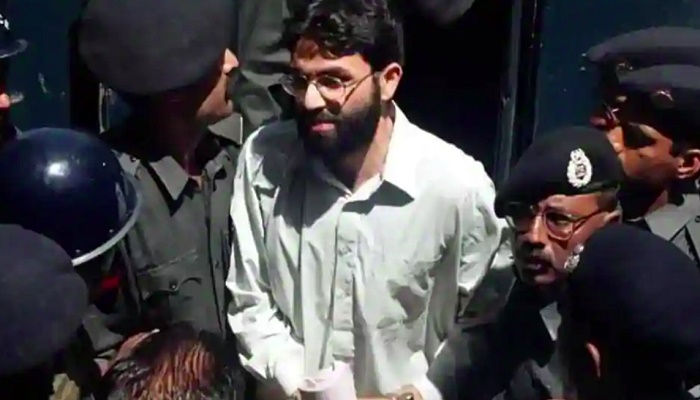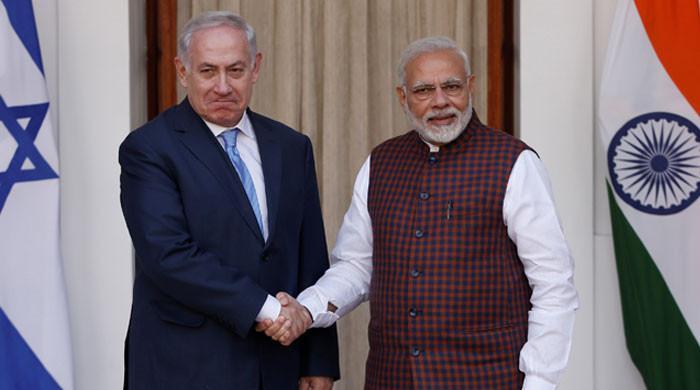The life story of Omar Saeed Sheikh reads like something out of a spy novel
From promising student to deadly terrorist, Sheikh has been at the front and center of war on terror
April 04, 2020

KARACHI: Sindh High Court had on Thursday morning overturned the death penalty handed out to Omer Saeed Sheikh, the alleged mastermind behind the kidnapping and killing of American journalist Daniel Pearl back in early 2002.
Although Sheikh was absolved of involvement in the killing of Pearl, the court convicted him of the lesser charge of kidnapping, handing him a seven-year prison term. Since Sheikh had served close to two decades on death row already, he was set to be released after the ruling.
However, the Sindh government on Friday morning invoked the Maintenance of Public Order (MPO) law to keep Sheikh in detention for another 90 days. The orders were issued under Section 3 of the MPO.
As the news of the verdict spread, several leading journalists and rights activists voiced surprise over the court decision. The US government also expressed concern over the acquittal of Sheikh through a message posted on Twitter by the State department.
Little is known about Omer Saeed Sheikh, the man who spent eighteen years on death row; who went from promising student to deadly terrorist in a matter of weeks; who was accused of being a double-agent; and whose life story reads like something out of a modern spy thriller.
Also read: Daniel Pearl case: Centre expresses reservations over SHC ruling
From promising student to deadly terrorist
Omar Saeed Sheikh is a British national born to Pakistani parents in London on December 23, 1973. His early education was in the United Kingdom, although he also spent four years at the prestigious Aitchison College in Lahore.
He then went to study at the London School of Economics (LSE), but dropped out before graduation. It is believed in some quarters that while Omar Sheikh was at the LSE, he was allegedly recruited by the British intelligence agency MI6 to infiltrate militant circles.
Several reports suggest that MI6 persuaded Sheikh to take an active part in demonstrations against Serbian aggression in Bosnia, and even sent him to Kosovo to join militants. At some point, Sheikh became a rogue or double agent.
On his return from Bosnia, Sheikh came to Pakistan, from where he went for guerrilla training in Khost in Afghanistan. In 1994 he was arrested in India as part of a gang which had kidnapped four Western tourists.
He was released in 1999 as part of a deal to secure the safety of passengers aboard a hijacked Indian airliner. After his release, Omar Sheikh settled in Lahore, but visited Afghanistan on four occasions to train operatives.
He claims that during these visits, he met Osama bin Laden and Mullah Omar, and that although he was not a permanent member of al-Qaeda, he helped to finance it through ransom money generated from kidnappings.
Also read: Sindh invokes public order law to prevent Daniel Pearl murder suspects from walking free
The kidnapping and murder of Pearl
In January 2002, Sheikh was informed that American journalist Pearl had turned up at the offices of militant organisations in Rawalpindi and Islamabad. He arranged a meeting with Pearl, at which the two exchanged telephone numbers and e-mail addresses.
It was at this meeting that Sheikh was alleged to have hatched a plan to kidnap Pearl to pressure the US government to change policies on convicts housed at Guantanamo Bay.
On February 5, 2002, Omar Sheikh surrendered to Pakistani authorities, and under interrogation, revealed that when his family members were arrested, he became desperate. He phoned an accomplice in Karachi named Hussein, and told him to release Daniel Pearl.
He claimed he was then told that Daniel Pearl had been killed.
'Hang me or free me'
Senior journalist Mazhar Abbas wrote about Sheikh only last year.
"Hang me or free me," a former Jail Superintendent in Hyderabad quoted Omar Saeed Sheikh as saying. Sheikh’s appeal against his death sentence had been pending for 18 years at the time.
On the condition of anonymity, the jail chief, who later also served in Karachi, said that Sheikh had been confined to a death cell, but was frustrated that his appeals against his death were stuck in court.
"Yes, I have met him a number of times during my posting in Hyderabad prison. He used to stay strange things at times, often inquired about his appeal and fate. Looked like a frustrated man," the jailer said.
The lawyer representing Sheikh, Khawaja Naveed, disclosed last year that since the death of a former public prosecutor in the case a few years back, no prosecutor has been appointed to take the case forward.
'Using religion as cloak for sins'
Former president retired general Pervez Musharraf, in his memoir titled In The Line of Fire, also wrote about Sheikh.
The world’s media received e-mails saying that the journalist Daniel Pearl had been kidnapped. The ransom demands included the release and return to Pakistan of prisoners in Guantanamo Bay.
The e-mails also stated: “We tell Americans that they shall never be safe on the Muslim Land of Pakistan. And if our demands are not met this scene shall be repeated again and again.”
I was incensed when I learnt of this, disgusted that these criminals were distorting a religion of peace and beauty and using it as a cloak for their sins. I immediately ordered all agencies to find Pearl’s kidnappers and the e-mails were traced to a man named Omar Saeed Sheikh.
The Wall Street Journal informed us that Pearl, who had arrived in Pakistan on December 29, 2001, with his wife, Marianne, had come to interview Pir Mubarik Ali Shah Jilani in connection with the story of the so-called shoe bomber, the Briton Richard Reid.
Our police detained and interrogated Jilani, who told them that Omar Sheikh had been very eager to meet the journalist. With this second mention of Omar Sheikh’s name, it seemed clear that he was involved.











